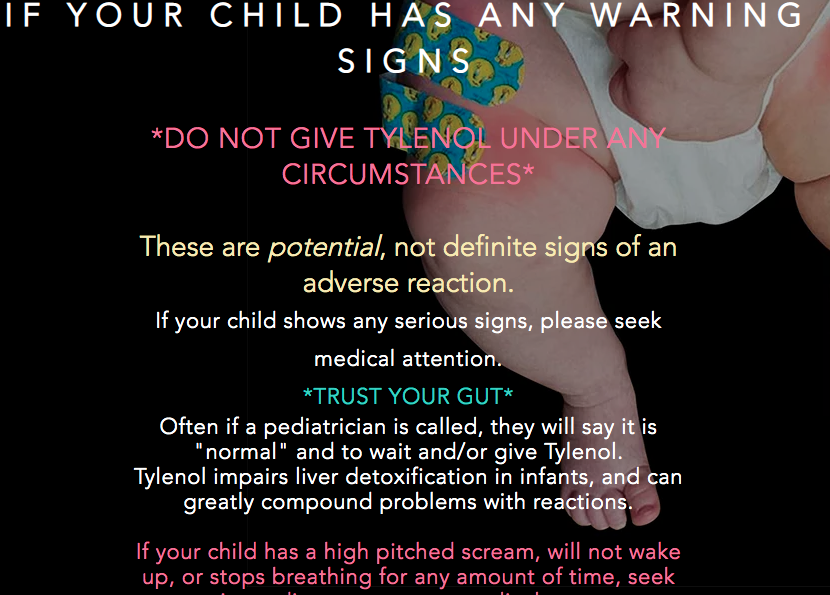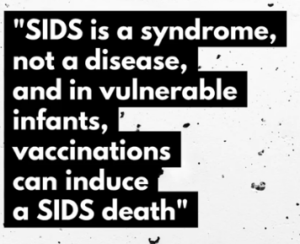Every parent wants the best for their baby. No rational parent seeks to harm their infant. The tragic death of Evee Gayle Clobes reminds us that not all babies can safely receive the one-size-fits-all vaccine schedule.
Catie Clobes describes how she missed the warning signs after each round of vaccines Evee received. The signs of adverse impact on Evee are clear in hindsight, yet Catie was given no information on what to look for. She trusted the CDC schedule recommended by her doctor. Evee tragically died 36 hours after her 6 months shots. Like many parents, Catie didn’t make the connection when it was right in front of her eyes. Please don’t ignore the warning signs. If you know anyone that continues to give vaccines, at least share this information so they can be aware of the signs.
Here is an introduction to the very short life of Evee Gayle Clobes:
“On Wednesday, February 27, 2019, Catie Clobes of Howard Lake, Minnesota brought her happy, healthy, well-developed 6-month-old baby girl Evee Gayle Clobes to her well-baby checkup, whereupon the pediatrician declared her to be in “perfect health” with no problems or concerns. After Evee was examined by her pediatrician, the nurse administered her shots according to the CDC recommended schedule – 6 doses total, via Pediarix and Prevnar.”
36 hours later Evee was dead. Please learn more and share this important story. https://www.justiceforevee.org/eveesstory


Go to Catie’s website to see a list of all the warning signs.

Science is clear that there are risks to the many routine procedures performed on babies as a “standard of care” practice in the USA and many other countries.
Vitamin K
- “The form of vitamin K known as vitamin K1 might lower blood sugar levels.” https://www.emedicinehealth.com/vitamin_k/vitamins-supplements.htm
- Vitamin K is injected into newborns at birth with the intention of increasing coagulation of the blood to prevent hemorrhage.
- Hematocrit is a measure of the percentage or proportion of red blood cells (erythrocytes) of the total blood volume.
- An increase in hematocrit is associated with increased blood viscosity and increased adhesiveness of platelets.
- High hematocrit is associated with hypercoagulation / hypercoagulability.
- “…erythrocytes are the main suppliers of phosphatidylserine-exposing membranes needed for coagulation…” https://www.ncbi.nlm.nih.gov/m/pubmed…
- “…vitamin K aims at rapid lowering of the international normalized ratio (INR) into a safe range to reduce the risk of major bleeding and therefore improving patient outcome without exposing the patient to the risk of thromboembolism due to overcorrection…” (Evee’s levels were sensitive to being “overcorrected”.) American Journal of Cardiovascular Drugs https://link.springer.com/article/10.2165/00129784-200404010-00005
- “Parenteral vitamin K1 (phytonadione) is used for anticoagulant reversal, and a boxed warning exists with intravenous and intramuscular administration due to the possibility of severe reactions, including fatalities. These reactions resemble hypersensitivity or anaphylaxis, including anaphylactoid reaction, and have led to shock and cardiac and/or respiratory arrest.” https://journals.sagepub.com/doi/full/10.1177/1076029616674825
Cardiorespiratory
- The title of a study from 2007 makes it clear that there are adverse impacts: “Primary Immunization of Premature Infants with Gestational Age <35 Weeks: Cardiorespiratory Complications and C-Reactive Protein Responses Associated with Administration of Single and Multiple Separate Vaccines Simultaneously.”
- 16% of infants in the study experienced immunization-related cardiorespiratory events, and 11% required oxygen therapy.
- “…infants were asymptomatic before immunization but had episodes of apnea, bradycardia, or [oxygen] desaturation after immunization…”
- “[Cardiorespiratory event] level is expected to be elevated in the 48 hours following immunization. In a minority of infants immunized, cardiorespiratory events were associated with presumed need for intervention.” https://www.sciencedirect.com/science/article/abs/pii/S0022347607001850
- “Possible Predictors of Cardiorespiratory Events after Immunization in Preterm Neonates.” Neonatology, U.S. National Library of Medicine, 2013, https://www.ncbi.nlm.nih.gov/m/pubmed/23887711/
Cranial nerve impairment
- “If one of these nerves or the area in the brain that controls them is damaged, the muscles they control may become paralyzed to varying degrees (called a palsy), and people may not be able to move their eyes normally. How eye movement is affected depends on which nerve is affected. People with one of these palsies may have double vision when they look in certain directions.” https://www.merckmanuals.com/home/brain,-spinal-cord,-and-nerve-disorders/cranial-nerve-disorders/overview-of-the-cranial-nerves
- “Motor Palsies of Cranial Nerves (Excluding VII) after Vaccination: Reports to the US Vaccine Adverse Event Reporting System.” Human Vaccines & Immunotherapeutics, Landes Bioscience, 2014, www.ncbi.nlm.nih.gov/pmc/articles/PMC4185907/.
Sudden Infant Death Syndrome (SIDS)
- Simultaneous sudden infant death (SIDS) syndrome. “Twin girls (3.5-month-old) were found dead by their mother in their crib, both in supine position. The infants were identical twins and delivered at a hospital by cesarean section. Both infants were healthy and did not have any serious medical history. Two days prior to the incident, the twins had received the second dose of oral polio, DPT and the first dose of hepatitis B vaccines and they had fever on the first day of the vaccination and been given teaspoonful of acetaminophen.” “Simultaneous Sudden Infant Death Syndrome.” Journal of Forensic and Legal Medicine, U.S. National Library of Medicine, Feb. 2007, https://www.ncbi.nlm.nih.gov/m/pubmed/17654772/
- One example of an award of compensation for sudden infant death in the Federal Vaccine Injury Compensation Program (VICP): https://ecf.cofc.uscourts.gov/cgi-bin/show_public_doc?2013vv0611-73-0
I acknowledge most of this list was compiled by Ashley Everly, Toxicologist, Mother, Activist, Science Writer. Author of Vaccine Guide.
Previous blogs on the topic of vitamin K:

Becky Hastings, passionate about Jesus, health, family, truth and healing foods. For more vaccine information you can start here.
